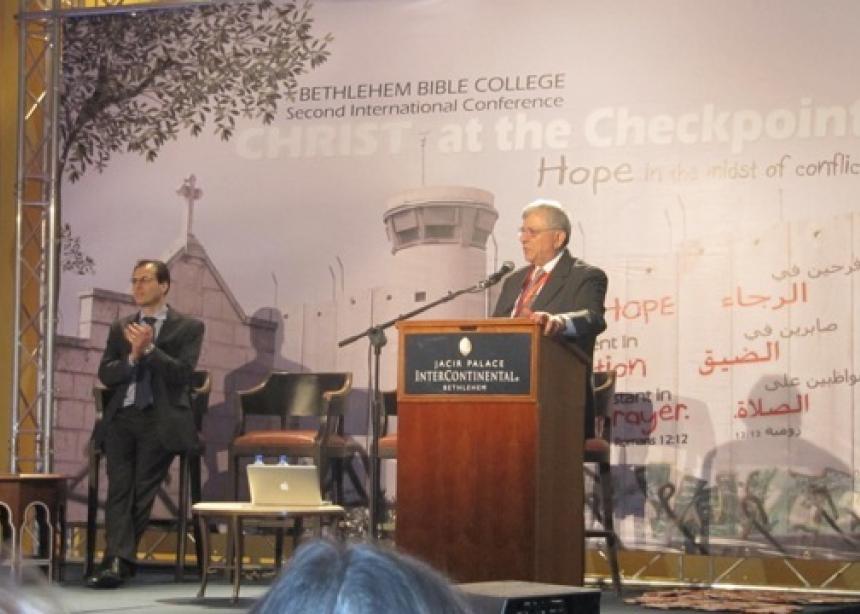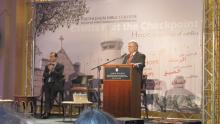A major breakthrough in the evangelical world took place in Bethlehem through a gathering of over 600 international and local Christians, including renowned evangelical leaders
like Ron Sider, John Ortberg, Stephen Sizer and Paul Alexander.
Organized by Bethlehem Bible College, which began 32 years ago in a Mennonite school, the conference, “Christ at the Checkpoint” addressed the issue of how to find hope in the midst of conflict. The conference exceeded all expectations.
For the first time, a broad spectrum of evangelical believers met literally at the “checkpoint,” and engaged biblically on issues that have historically divided them. Subjects included, Christian Zionism, Islamism, justice, nonviolence, and reconciliation. These themes were intended to create an ongoing forum for Christian peacemaking within the context of the Israeli Palestinian conflict. The conference included inspirational messages, Bible study, interactive workshops, panels and site visits.
Defying the temptation to despair, Palestinian Christians demonstrated renewed hope to continue to stand nonviolently against the injustice of occupation. They also acknowledged the right of the State of Israel to exist within secure borders.
Speakers in addition to Ron Sider, John Ortberg, Stephen Sizer and Paul Alexander, included Bishara Awad, Munther Isaac, Salim Munayer, Yohanna Katanacho and Alex Awad of Bethlehem Bible College, Shane Claiborne, founding partner of The Simple Way, Joel Hunter, who prays frequently with President Obama and Colin Chapman an instructor in Islamic studies.
Participants from 20 nations and a sizeable delegation of university students were moved by the testimony of Palestinian men and women who shared the pain and suffering they experience on a daily basis caused primarily by the continuing occupation.
A unique aspect of the conference was the presence and presentations by members of the Messianic community including Richard Harvey, Evan Thomas and Wayne Hilsden, who provided an integral contribution to the dialogue.
Conference organizers challenged the evangelical community to cease looking at the Middle East through the lens of “end times” prophecy and instead rallied them to join in following Jesus in the prophetic pursuance of justice, peace and reconciliation. “Active non-vioence is critical to the gospel and needs to receive priority,” said Ron Sider. “Unless we take action, our rhetoric will be empty.”
Conference Organizers: John Angle, Alex Awad, Bishara Awad, Sami Awad, Steve Haas, Munther Isaac, Yohanna Katanacho, Manfred Kohl, Salim Munayer, Jack Sara, Stephen Sizer
The Christ at the Checkpoint Manifesto
- The Kingdom of God has come. Evangelicals must reclaim the prophetic role in bringing peace, justice and reconciliation in Palestine and Israel.
- Reconciliation recognizes God’s image in one another.
- Racial ethnicity alone does not guarantee the benefits of the Abrahamic Covenant.
- The Church in the land of the Holy One, has born witness to Christ since the days of Pentecost. It must be empowered to continue to be light and salt in the region, if there is to be hope in the midst of conflict.
- Any exclusive claim to land of the Bible in the name of God is not in line with the teaching of Scripture.
- All forms of violence must be refuted unequivocally.
- Palestinian Christians must not lose the capacity to self-criticism if they wish to remain prophetic.
- There are real injustices taking place in the Palestinian territories and the suffering of the Palestinian people can no longer be ignored. Any solution must respect the equity and rights of Israel and Palestinian communities.
- For Palestinian Christians, the occupation is the core issue of the conflict.
- Any challenge of the injustices taking place in the Holy Land must be done in Christian love. Criticism of Israel and the occupation cannot be confused with anti-Semitism and the delegitimization of the State of Israel.
- Respectful dialogue between Palestinian and Messianic believers must continue. Though we may disagree on secondary matters of theology, the Gospel of Jesus and his ethical teaching take precedence.
- 12.Christians must understand the global context for the rise of extremist Islam. We challenge stereotyping of all faith forms that betray God’s commandment to love our neighbors and enemies. --March 22, 2011



Add new comment
Canadian Mennonite invites comments and encourages constructive discussion about our content. Actual full names (first and last) are required. Comments are moderated and may be edited. They will not appear online until approved and will be posted during business hours. Some comments may be reproduced in print.